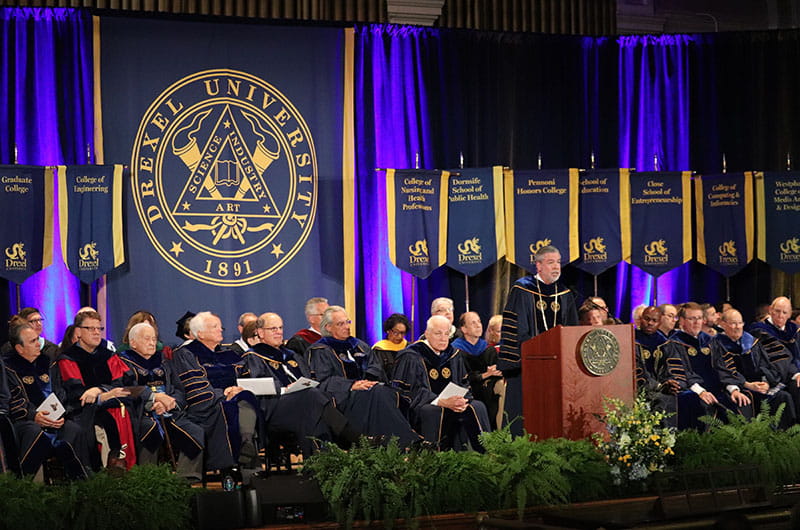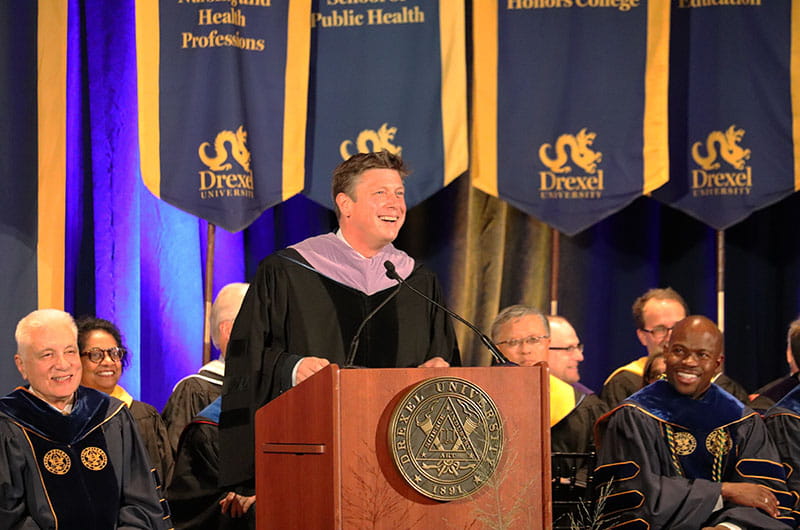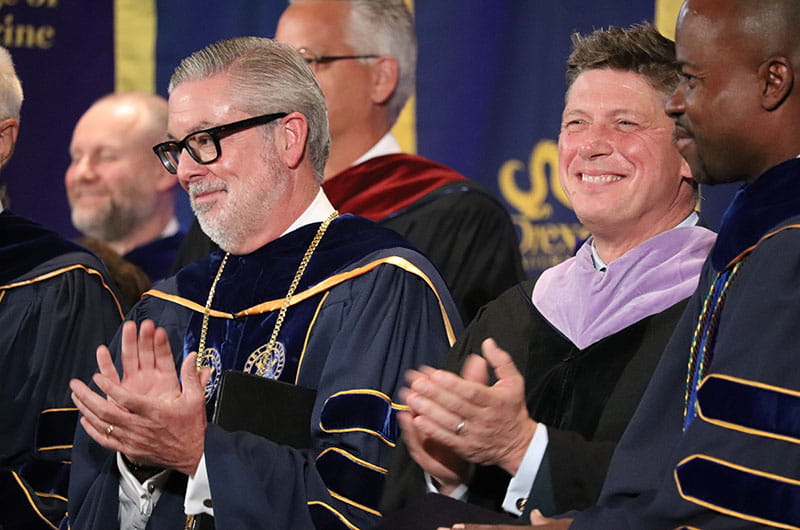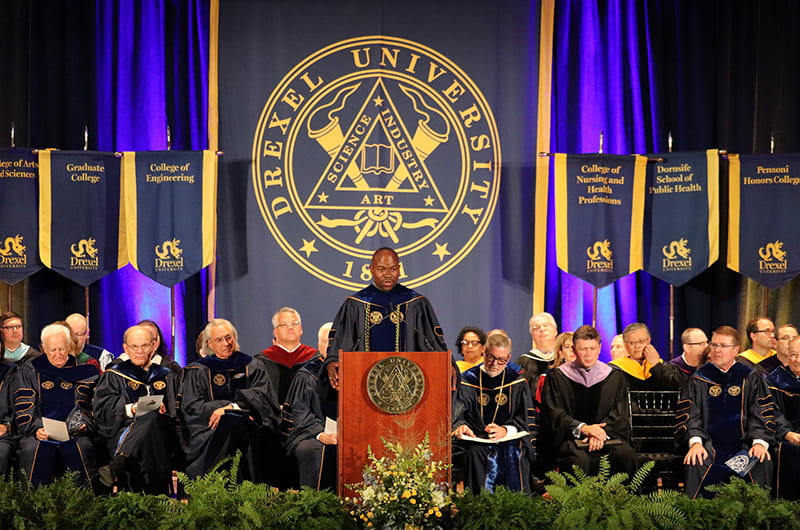Speakers Celebrate the Power of Scientific and Artistic Wonder at 2018 Convocation

- Drexel’s College of Nursing and Health Professions Receives $1 Million for Scholarships from the Bedford Falls Foundation – DAF to Address Nursing Workforce Shortage
- Laura Turner to Join Drexel University as Senior Vice President for Institutional Advancement
- When the World Changes, Drexel Changes With It
- U.S. Department of Education Provides Final Approval of Drexel and Salus Merger

In Drexel University’s 2018 Convocation ceremony held Sept. 27, Dragons were encouraged to take full advantage of the opportunities and resources at the University to understand, research, prepare and communicate the problems and solutions of the future.
Drexel’s historic and lauded co-op program, its academic and interdisciplinary offerings and its research opportunities are all opportunities to support this endeavor — and so are, as highlighted in this year’s ceremony, its four archival collections and the Academy of Natural Sciences’ museum, collection and library.
In his speech, Drexel President John Fry highlighted these collections by describing “just how important they are to our mission as a research university.”
“[University founder] A.J. Drexel’s vision included building a great art collection for students and faculty to engage in the applied study and research of arts, industry and science,” he said.
The Drexel Collection, the University’s core collection of decorative and fine arts objects, grew out of a $1 million donation (about $26 million today, adjusted for inflation) the founder gave to his fledging institution so that Drexel’s first president, James MacAlister, could travel to Europe and acquire works of art and design that formed the basis of the Drexel Museum, which is what the collection was originally called. It was used as a teaching tool for students to “improve their aesthetic preparation and appreciation, while acquiring their education,” Fry said.
“Our founder was at the forefront of progressive thinking, realizing that if you place objects within an educational setting, they can tell us so much about the world,” he added. “I think that was one of the timeless ideas that A.J. Drexel had, and that we are so proud to carry on today.”
The Drexel Collection is still used as a teaching tool today, as are all of Drexel’s archival collections: Drexel University Archives, which stores Drexel’s rare books, documents and history; the Robert and Penny Fox Historic Costume Collection, which houses about 20,000 fashion garments and textiles; and the Drexel University College of Medicine Legacy Center Archives, which documents the history of women in medicine and keeps the memory alive of the historic medical colleges out of which the College of Medicine grew.
And then, of course, there’s also the Academy of Natural Sciences of Drexel University, whose president, Scott Cooper, PhD, was the keynote speaker at this year’s Convocation. Cooper highlighted how the Academy is uniquely poised to advance the public and the personal understanding of the natural world, and has been since its 1812 founding. But to illustrate his point, he turned to an unlikely source — his young daughter’s favorite bedtime story book.
Cooper read the entirety of the children’s book “I Know the Moon,” written by Stephen Axel Anderson, to the University audience. In the book, five creatures — a fox, a moth, an owl, a mouse and a frog — discuss what they think the moon is (hence the title of the story). The mouse, for example, thinks it’s “a seed in endless bloom,” while the owl believes it’s “a window in a midnight room.” Finally, the animals turn to a character known as the Man of Science, who lives “alone with his thoughts in a tower high enough to almost touch the moon.” He reads the answer to them from a book, but the animals don’t understand what he was explaining, and so they leave, each believing their own individual conviction was the correct answer.

This allegory, Cooper said, is “what I consider to be one of the most insightful, incisive and powerful essays on epistemology, science and society that I’ve ever read.”
The animals, acting as citizen scientists, turned to a trusted source to learn about a fundamental question of natural science. But the Man of Science did not recognize the opportunity to widen and enrich their understanding, and he was not able to explain science to them in an easily understandable way.
The Academy of Natural Sciences will definitely not be making the same mistake.
Last year, the Academy served over 260 local schools, hired 65 Drexel co-op students and secured nearly $5 million in grants and contracts. Its scientists published 61 peer-reviewed articles, delivered 80 presentations, visited 12 countries, described 37 new species and unearthed six new species of dinosaur. The College of Arts and Sciences’ Department of Biodiversity, Earth and Environmental Science (BEES), in which the Academy is deeply involved through faculty, courses and research and professional opportunities for students, taught 160 undergraduates and 40 graduates in the department, as well as 600 students from majors throughout the University.

“Science museums around the world need to communicate and engage both internally and externally in very different ways … if they are to fulfill their full value for the future,” said Cooper.
For the Academy of Natural Sciences, this involves continuing to advance education, research, engagement and outreach related to climate change, human evolution, environmental outreach, extinction and loss of biodiversity and other scientific facts that may conflict with others’ deeply held convictions. By doing this, the Academy of Natural Sciences will encourage approaches to fostering interdisciplinary thinking, encouraging community science, advancing science literacy, supporting environmental justice and creating an institution that is “truly inclusive and accessible to everyone,” according to Cooper.
“The Academy of Natural Sciences of Drexel University will help you do what the mouse and owl and moth and fox each do very well. And really, what you are all here for,” Cooper told the Convocation audience. “It will help you wonder.”
M. Brian Blake, PhD, executive vice president and the Nina Henderson Provost of Drexel University, also discussed the importance of wonder and questioning — but on a deeply personal level. Over the summer, while researching his family history, he discovered that his great-grandfather, who was born a free man, grew up on and worked at the Groton Plantation in Allendale, South Carolina. That Groton Plantation, as it turns out, had been purchased by Robert Winthrop, a New York banker who went into business with the University founder through the Drexel, Winthrop and Company banking firm.

“What is the likelihood of four generations of Blakes being connected to Drexel? And that I would find out at the summer of my third year?” Blake asked.
Blake asked the faculty, staff, students and alumni at Convocation to realize and develop their own connection to Drexel — though it didn’t have to necessarily be a familial connection, like his.
“It might be for our meteoric progress over the past decade. Perhaps, it is because you like the culture of innovation and problem-solving,” Blake said. “I’m going to ask you this year to embrace your connection.”
Click here to view a photo gallery of additional photographs from Drexel's 2018 Convocation.
In This Article
Drexel News is produced by
University Marketing and Communications.
